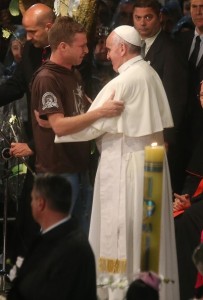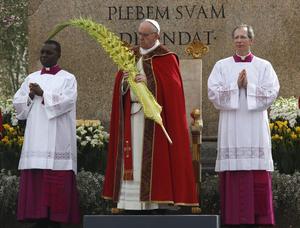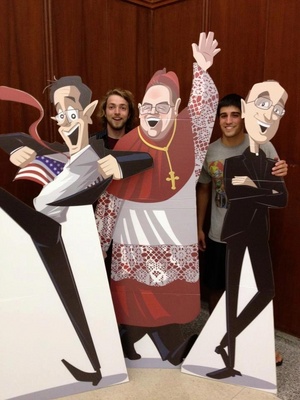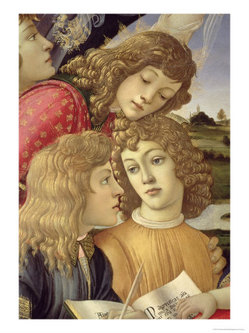Pope Francis’ talk strikes a significant cord with me and he’s forcing me examen my own behavior, my own capacity and willingness “to look upon one another with the loving eyes of Christ.” This is a good thing. And I have to admit, after a series of disappointments and lies, the person living in addiction makes a personal relationship harder and harder to cherish. In this last year I have had to live my faith a lot differently with a person close to me dealing with her addiction to alcohol and depression concomitant wrong healthcare and interpersonal decisions. Many trips to the hospital, many encounters with lying and avoiding, many ugly things said are seeming hallmarks of what is given due to the paralyzation of addiction. Some of you know that addiction of any kind does require what the Pope indicates, an embrace that feels close, affectionate and loving. Addiction destroys; addiction is the work of the devil; it closes off the horizon of hope; it is allows for one to abandon personal freedom and to live a life of isolation.
And while addictions are often thought of as chemical imbalances or problems of the will, I do sometimes think those without such are addicted in other ways: the use of the words, rigidly holding to our opinions, being angry, arrogance, a lack of humility and the like.
The Christian manner of living is about freedom, joy, about truth, about the journey. Christ gives us a new humanity. Addiction is just the opposite.
Read Pope Francis’ address very closely. But use what he says to open a new horizon in yourself: does what the Pope say open a new door to see another way of living? Of being a coherent Christian?
 God has willed that my journey, after the Shrine of Our Lady of Aparecida, should take me to a particular shrine of human suffering – the Saint Francis of Assisi Hospital. The conversion of your patron saint is well known: the young Francis abandoned the riches and comfort of the world in order to become a poor man among the poor. He understood that true joy and riches do not come from the idols of this world – material things and the possession of them – but are to be found only in following Christ and serving others. Less well known, perhaps, is the moment when this understanding took concrete form in his own life. It was when Francis embraced a leper. This brother, suffering and an outcast, was the “mediator of light … for Saint Francis of Assisi” (Lumen Fidei, 57), because in every suffering brother and sister that we embrace, we embrace the suffering Body of Christ. Today, in this place where people struggle with drug addiction, I wish to embrace each and every one of you, who are the flesh of Christ, and to ask God to renew your journey, and also mine, with purpose and steadfast hope.
God has willed that my journey, after the Shrine of Our Lady of Aparecida, should take me to a particular shrine of human suffering – the Saint Francis of Assisi Hospital. The conversion of your patron saint is well known: the young Francis abandoned the riches and comfort of the world in order to become a poor man among the poor. He understood that true joy and riches do not come from the idols of this world – material things and the possession of them – but are to be found only in following Christ and serving others. Less well known, perhaps, is the moment when this understanding took concrete form in his own life. It was when Francis embraced a leper. This brother, suffering and an outcast, was the “mediator of light … for Saint Francis of Assisi” (Lumen Fidei, 57), because in every suffering brother and sister that we embrace, we embrace the suffering Body of Christ. Today, in this place where people struggle with drug addiction, I wish to embrace each and every one of you, who are the flesh of Christ, and to ask God to renew your journey, and also mine, with purpose and steadfast hope.
To embrace – we all have to learn to embrace the one in need, as Saint Francis did. There are so many situations in Brazil, and throughout the world, that require attention, care and love, like the fight against chemical dependency. Often, instead, it is selfishness that prevails in our society. How many “dealers of death” there are that follow the logic of power and money at any cost! The scourge of drug-trafficking, that favors violence and sows the seeds of suffering and death, requires of society as a whole an act of courage. A reduction in the spread and influence of drug addiction will not be achieved by a liberalization of drug use, as is currently being proposed in various parts of Latin America. Rather, it is necessary to confront the problems underlying the use of these drugs, by promoting greater justice, educating young people in the values that build up life in society, accompanying those in difficulty and giving them hope for the future. We all need to look upon one another with the loving eyes of Christ, and to learn to embrace those in need, in order to show our closeness, affection and love.
To embrace someone is not enough, however. We must hold the hand of the one in need, of the one who has fallen into the darkness of dependency perhaps without even knowing how, and we must say to him or her: You can get up, you can stand up. It is difficult, but it is possible if you want to. Dear friends, I wish to say to each of you, but especially to all those others who have not had the courage to embark on our journey: You have to want to stand up; this is the indispensible condition! You will find an outstretched hand ready to help you, but no one is able to stand up in your place. But you are never alone! The Church and so many people are close to you. Look ahead with confidence. Yours is a long and difficult journey, but look ahead, there is “a sure future, set against a different horizon with regard to the illusory enticements of the idols of this world, yet granting new momentum and strength to our daily lives” (Lumen Fidei, 57). To all of you, I repeat: Do not let yourselves be robbed of hope! And not only that, but I say to us all: let us not rob others of hope, let us become bearers of hope!
In the Gospel, we read the parable of the Good Samaritan, that speaks of a man assaulted by robbers and left half dead at the side of the road. People pass by him and look at him. But they do not stop, they just continue on their journey, indifferent to him: it is none of their business! Only a Samaritan, a stranger, sees him, stops, lifts him up, takes him by the hand, and cares for him (cf. Lk 10:29-35). Dear friends, I believe that here, in this hospital, the parable of the Good Samaritan is made tangible. Here there is no indifference, but concern. There is no apathy, but love. The Saint Francis Association and the Network for the Treatment of Drug Addiction show how to reach out to those in difficulty because in them we see the face of Christ, because in these persons, the flesh of Christ suffers. Thanks are due to all the medical professionals and their associates who work here. Your service is precious; undertake it always with love. It is a service given to Christ present in our brothers and sisters. As Jesus says to us: “As you did it to one of the least of these my brethren, you did it to me” (Mt 25:40).
And I wish to repeat to all of you who struggle against drug addiction, and to those family members who share in your difficulties: the Church is not distant from your troubles, but accompanies you with affection. The Lord is near you and he takes you by the hand. Look to him in your most difficult moments and he will give you consolation and hope. And trust in the maternal love of his Mother Mary. This morning, in the Shrine of Aparecida, I entrusted each of you to her heart. Where there is a cross to carry, she, our Mother, is always there with us. I leave you in her hands, while with great affection I bless all of you.
Pope Francis
Saint Francis of Assisi Hospital
Brazil




